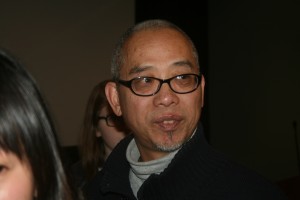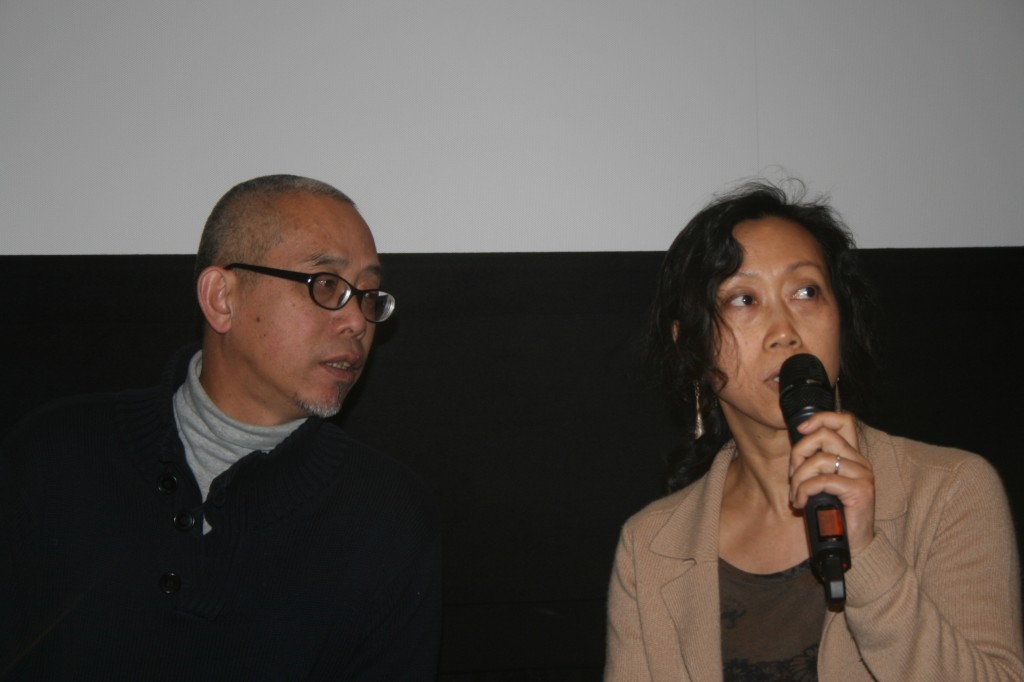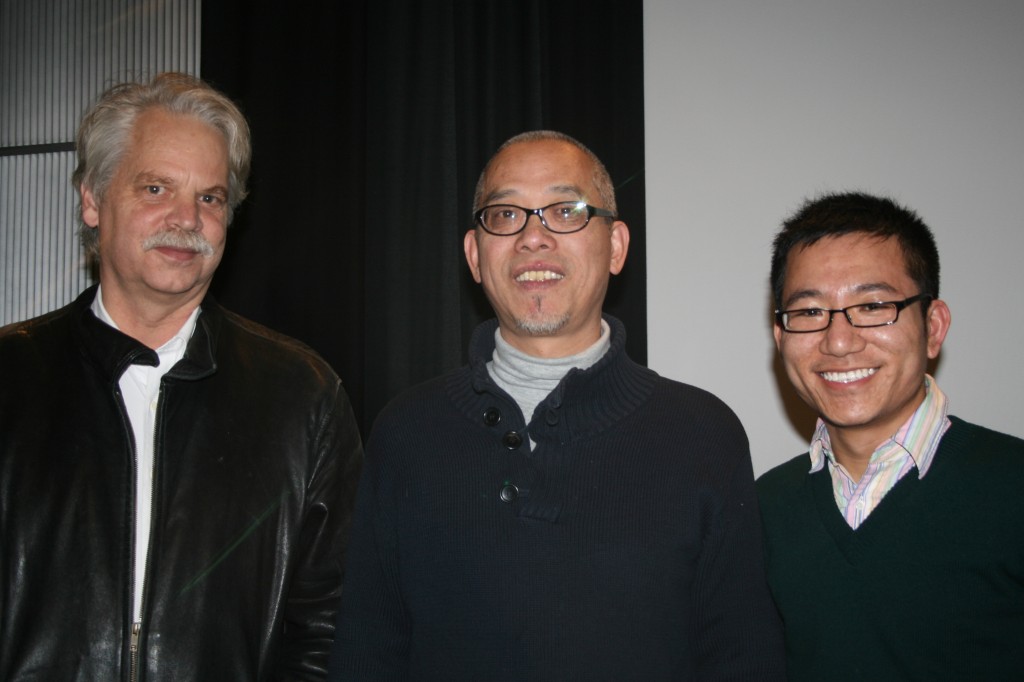This fall I devoted a week of my World Documentary course to the films of Wu Wenguang, so I was delighted to have the chance to meet him in person. Unfortunately I was only able to attend one day of his NYU visit (Sunday, December 4th) because we had a competing conference at Yale. He showed his 2005 documentary, Fuck Cinema, and the work of his colleague Zou Xuenping, entitled Satiated Village (2011)--a follow-up to her earlier documentary Starving Village. Although I can report that Yale graduate and undergraduate students were at the Wu event in force, Wenguang himself proved quite elusive. He was charming and offered up a number of discerning remarks that might be characterized as aphorisms. At the same time, he gave a self-deprecating performance of self in which his past and even his ongoing actions were consciously revealed in an unsympathetic light.
Fuck Cinema is certainly interesting in relation to Wu’s first documentary, Bumming in Beijing: The Last Dreamers (1990). In that film he made a film about his friends, a circle of struggling artists, hoping to make it big. Some wrote, some staged plays and some painted. Wenguang made a film. They were dreamers, idealistic artists who supported each other in a desperate affirmation of friendship and community. Or as Wu put it: “When young, I was more a dreamer. Art was just an excuse–a pretext for life.” By the time he made Fuck Cinema, Wenguang was no longer so young. “If art is not just an overcoat, one has to think about why one is doing it.”
Fuck Cinema focuses on Wang, a 28-year-old aspiring filmmaker just as desperate and determined as the last dreamers. But now Wu’s circle of associates are successful and often internationally famous filmmakers who are ready to meet Wang and listen to him pitching his film script as a favor to Wenguang. They toy with Wang and talk to Wenguang. There is a deal–Wang gains access to the powerful and influential while Wu gets material for his film. Power relations are obviously not equal. Wenguang said that he (Wu) was largely absent in the initial cut of the film but as he reworked it, he became more present and exposed the unpleasant side of what he was doing–which had previously been hidden. Here is another of his aphorisms: “For every documentary, there is a story behind it–a secret buried on the way to truth.” He ultimately decided to reveal the secret or as his colleagues approvingly noted, “strip naked and show his lower body to all who would look.” In this respect, Wu Wenguang reminded me of the Japanese documentary filmmaker Taksuya Mori, who recently visited Yale via Skype to talk about his new documentary 311. Like Wu, Mori had stopped making films because he found it to be a form of violence. In 311, as to some extent in his earlier documentaries such as A, he as filmmaker performs this violence anew.
It was interesting to learn that Fuck Cinema had a number of earlier working titles–What is Cinema? and What is Film? Wu Wenguang came up with the new title at the Tokyo Film Festival after a bunch of filmmakers were complaining about the awards ceremony at which one luck person received the top monetary award of $200,000. The entire table of unhappy, rejected international filmmakers were exclaiming, “Fuck the festival,” “Fuck the juries,” “Fuck the director.” And at that moment the final title for Wu’s documentary was conceived.
OK, I agree that there is a certain kind or degree of violence in making almost any documentary. But there is also, at least in the kinds of documentaries that I have tended to make–love, admiration and fascination. Documentary becomes a way to better understand. It becomes an intrusion and then an exposure. When I made my documentary on potter Gerry Williams, with whom I “apprenticed,” and who was a father figure, it was certainly a loving portrait. Yet besides burning some holes in the ceiling of his studio with our lights (and breaking a pot or two), I removed a section of the film in which Gerry expressed his mystical, Hindu inflected views on reincarnation. (Gerry’s father was a close friend of Gandhi.) Peter Davis (another father figure!) urged me to take it out because it made Gerry look foolish. Peter was right. In protecting Gerry I also did violence to a full portrait–and to what my subject would have liked in the film. On the other hand, one of Gerry’s colleague (also named Peter) felt the real violence was elsewhere. Gerry often showed the film and became, in Peter’s opinion, a charicature of his filmic persona–stuck in time. That is, of course, far more unsettling (as well as unkind and certainly disputable).
Anyway, I felt that Wenguang was sometimes performing this violence not only in the film Fuck Cinema but in front of yesterday’s audience. When I asked what Wang got out of appearing in the film, Wu insisted that Wang got nothing–and that he did not know what the aspiring filmmaker was doing or where he was. Wu was performing his own exaggerated indifference. Later someone quietly reassured me that Wu did know where Wang was–back in his home village–and that Wu had given him some money on at least two occasions.
The second film, Satiated Village, is part of Wu’s Village Video project. I don’t feel qualified to even begin to judge this project, which obviously seems quite important. Rather I saw it right after Fuck Cinema, and in this context there seemed to be certain similarities. Made by the twenty-five year old Zou Xueping, one gets almost no sense of the structures and dynamics of village life (though one does get the sense that all the villagers lack heat!). In much of it, she insistently interviews her parents–asking why they don’t appreciate and support her choice to be a filmmaker. They explain some of their reasons, but she persists as if she is going to change their minds by her persistence. I couldn’t help but feel that she was performing the role of needy child seeking her parent’s approval. Many people went into filmmaking without parental approval and the customary way to convince them is not through words but through actions (and also indifference to their opinions!). For some, acceptance comes more quickly than for others. Satiated Village is perhaps made at their expense–-an inside out version of Wang.
Satiated Village is a follow up to Starving Village, Zou’s earlier film on the villagers confrontation with starvation during the Great Leap Forward. I wish I could see the earlier picture. I should get the Yale Film Study Center to buy it on DVD. The children in Zou’s current film are wonderful, the aging elders are stoic –and heroic in what they have endured. Zou herself is still rebelling against her parents (and older brother). Worse things have happened, but the film becomes first and foremost a self-portrait of a young filmmaker trying to find her way –someone Wu helped with sincerity as well as emotional and material support.
These documentaries raise issues about what we as filmmakers owe our subjects. Perhaps Wang was/is a true fool–impossible to deal with. But even now, Wu Wenguang may owe him something more–perhaps he too could be a member of the Village Video project. Or else find a job as a production assistant on one of his friend’s feature films. Whatever they may feel, Zou owes it to her village and perhaps her country to show Starving Village. She may owe her parents something else. We do owe the subjects of our film a great deal. I paid Gerry Williams for his involvement in An American Potter–a small amount up front. Deferred payments, which he ultimately received in toto, were also built into our arrangements. And after everyone was paid off, he (or the foundation with which he worked) was supposed to receive half the income from the documentary. Of course, in my case some of this may have been what I felt I owed my master and mentor. But the question of money is only symptomatic. A student in Documentary Film Workshop was so concerned that he would exploit his subject and their friendship (forged in shooting the film), that I told him he should just promise the guy half the income from the film (say half a festival prize!) even if the chances of seeing any money were slight.
A day with Wu Wenguang at NYU raised questions. Perhaps this is to say that he was a successful provocateur. And no doubt a real trouble maker. I can only identify.



